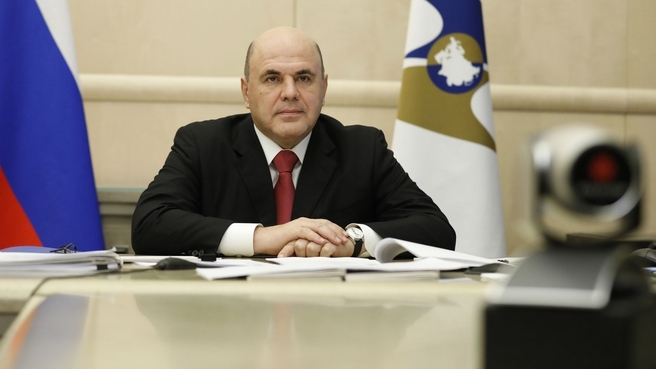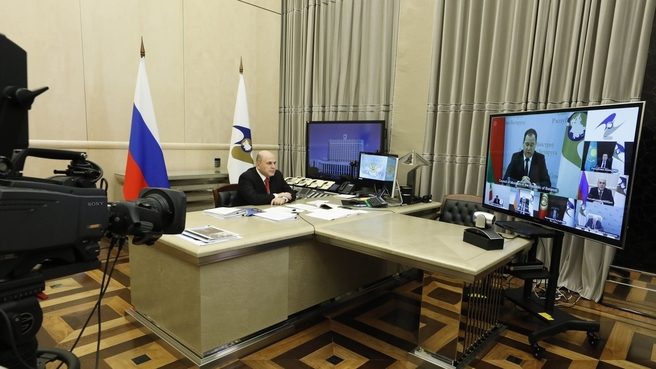Eurasian Intergovernmental Council meeting
Delegation heads taking part in the Eurasian Intergovernmental Council meeting
Delegation heads taking part in the Eurasian Intergovernmental Council meeting:
Prime Minister of the Republic of Armenia Nikol Pashinyan
Prime Minister of the Republic of Belarus Roman Golovchenko
Prime Minister of the Republic of Kazakhstan Askar Mamin
Acting Prime Minister of the Kyrgyz Republic Artem Novikov
Prime Minister of the Russian Federation Mikhail Mishustin
Prime Minister of the Republic of Moldova Ion Chicu
Chairman of the Eurasian Economic Commission Board Mikhail Myasnikovich
Good afternoon, colleagues,
This is the sixth time that we are holding a meeting of the Eurasian Intergovernmental Council this year. Ion Chicu, Prime Minister of the Republic of Moldova, the Union’s observer country, is attending this session together with heads of government of the EAEU member states. We expect our Moldovan colleagues to continue their constructive interaction with the EAEU following their recent presidential elections.
Russia regards the EAEU development as an unconditional priority. Our integration cooperation rests of the principles of pragmatism, common striving for stable economic development, a better investment climate and successful business operation. This means that it is aimed at ensuring that people’s incomes grow in all its member countries and their living standards improve. This is why we established the Eurasian Economic Union five years ago.
During the recent six months we were active in finalising some provisions of the Strategic Directions for Developing the Eurasian Economic Integration until 2025. Our priority objective is to secure what we have defined as four freedoms: free movement of goods, services, capital and workforce in the EAEU internal market. It is necessary to complete formation of common markets on its territory, promote joint investment and adoption of innovations, remove barriers inside the EAEU, expand trade relations with third countries and increase the Union’s share in global trade.
I would like to speak briefly about the Eurasian Economic Union’s main tasks, the digital agenda, first and foremost. This is in particularly high demand today, when global ties and social contacts are being disrupted, due to the coronavirus pandemic and related restrictions. Digital technologies help facilitate the work of vitally important sectors of the economy in this situation. Digital integration is becoming the main factor in forming a joint economic space and creating the Union’s joint infrastructure based on the network principle without any intermediaries and obstacles.
Digital transformation in the Eurasian Economic Union calls for launching large-scale joint projects in key economic sectors. They mostly aim to give effect to the four freedoms on which our Union hinges. This entails industrial initiatives, digital transport corridors and expanded e-commerce. We are moving to coordinate decisions that will make it possible to simplify numerous economic and technological processes.
The Eurasian Economic Union is launching the pilot project Travelling without COVID-19, drafted by the Eurasian Development Bank. This is the equivalent of a digital document confirming that its bearer is not infected with the coronavirus. The use of this service will make things much easier for travellers and will help reduce pandemic risks.
The development of a mechanism for marking goods and its introduction is another important direction. This advanced technology considerably reduces illegal goods sales, especially in the consumer sector, and facilitates the creation of a competitive business environment. Projects launched in this sphere have already yielded results. The introduction of the footwear labelling process has made it possible to more accurately gauge the depth of the domestic market. Initially, it was estimated at 400 million pairs; however, more than one billion pairs of shoes have been legally sold since early 2020.
It is possible to obtain labelling codes without any obstacles in intra-EAEU trade. Member states join the system as soon as they are ready, and no rigid deadlines are stipulated.
With this in mind, we suggest that our colleagues step up joint work to implement the agreement, so as to introduce the labelling system for certain categories of goods stage by stage.
We consider the consistent elimination of obstacles on the Union’s market to be highly important. Over 50 barriers, as well as numerous restrictions and exemptions, have been eliminated to date. However, new obstacles appear, as we expand cooperation spheres, and it is also necessary to get rid of them. Today, we are discussing the relevant plans for the next two years: 2021and 2022.
We are also approving regulations for determining the country of origin of goods on the Union’s territory. This concerns state and municipal purchases and will help create equal competition opportunities for producers and suppliers of all five EAEU member states.
We attach great significance to establishing a common services market within the framework of the Eurasian Economic Union, including in construction. We have drafted an action plan for charting common approaches towards the professional qualifications of such services’ providers. These fundamental principles will be formalised in an international treaty on the mutual recognition of such qualifications. This matter is also related to the labour migration and touches upon the interests of the business community and our countries’ citizens.
The coronavirus pandemic has negatively affected the labour market. It is now important to stabilise the situation and to work on new initiatives that will make it possible to ensure free and safe workforce movement on the Union’s entire territory. This remains our high-priority goal even in conditions of lockdown restrictions.
We have launched the project Work without Borders, which is currently being tested. The project allows any citizen or employer to find vacancies or applicant resumes in all EAEU countries. If necessary, this service could become a component of an information system for recording labour migration volumes.
Additionally, we are developing the Work in the EAEU mobile app, which will make it possible to provide foreign citizens with a range of government services, as regards employment in Russia. If our esteemed partners agree, we think it would be useful to spread this idea to all Union states and make this process absolutely transparent. This provides an opportunity for creating a truly free labour market without any barriers in our countries.
Russia calls for expanding the Union’s international ties. Members of the Joint Commission on Implementing the Agreement on Trade and Economic Cooperation with China met for the first time a month ago. Members of research groups to assess opportunities for signing free trade agreements with India and Mongolia have also started working. We are also ready for a dialogue in any format with other partners.
In conclusion, I would like to thank all our colleagues for their active joint work, and I would like to thank Belarus for successfully fulfilling its duties as a Chair-in-Office of the Union. We are counting on further close and fruitful work with all of you next year, with Kazakhstan as an incoming chair.
Thank you.











